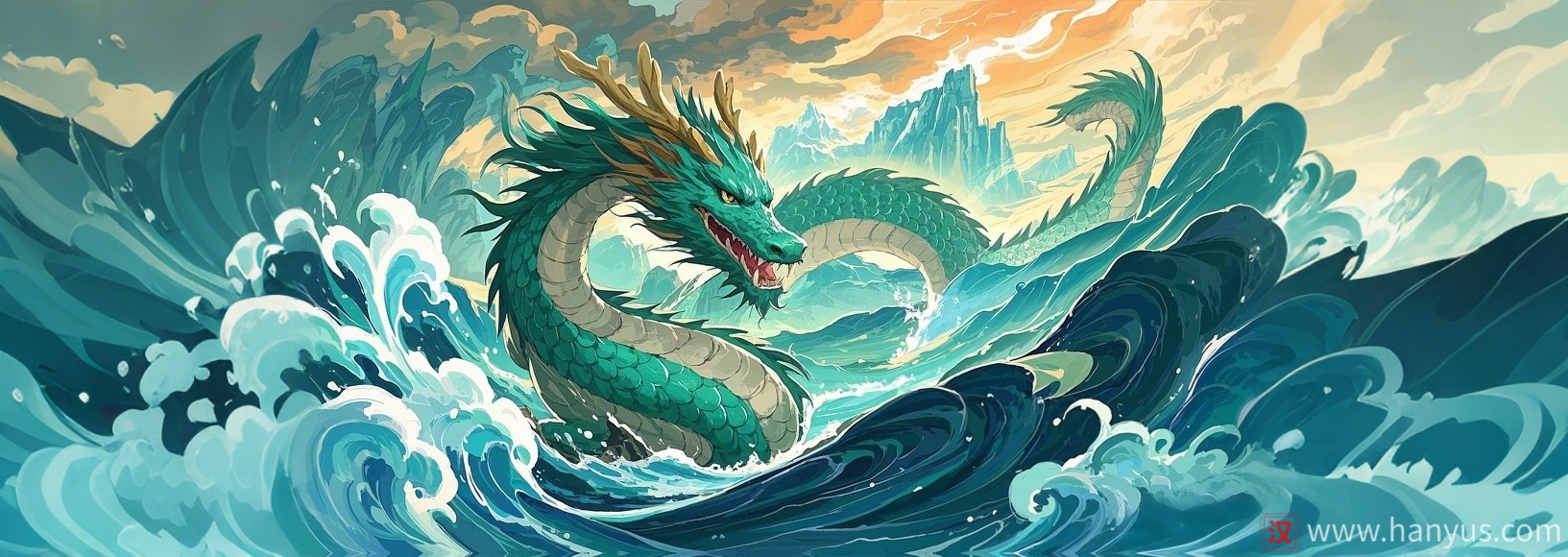I. Divine Profile
Alternative Names
East Sea Dragon King (official title), Ao Guang (personal name), Sea Dragon King (folk name), Old Dragon King (fishermen’s honorific)
Appearance
- Dragon-headed humanoid with shimmering blue scales
- Three-foot silver beard, eyes like night pearls
- Wears a seven-jeweled crown and nine-section coral belt
- Holds a tide-controlling pearl and sea-stabilizing needle (Xiyouji, Chapter 3: “weighs 13,500 catties”)
Abilities
- Manipulates tides and storms (Huainanzi: “Dragon King’s movement stirs the seas”)
- Controls rainfall patterns (Taiping Guangji: “regulates droughts and floods”)
- Commands aquatic armies and treasure hoards (Fengshen Yanyi, Chapter 14: “guards 108,000 treasures”)
II. Mythological Origins
Descendant of the Yellow Emperor’s dragon lineage (Shanhaijing). Established as chief of the Four Sea Dragons in Fengshen Yanyi. Tang Dynasty texts record his syncretization with Buddhist nāga figures.
III. Key Legends
1. Nezha’s Rebellion (Late Shang Dynasty)
After his son Ao Bing was killed, Ao Guang flooded Chentangguan before being subdued by Taiyi Zhenren (Fengshen Yanyi, Chapter 14).
2. Monkey King’s Treasure Theft (Tang Dynasty)
Forced to surrender the sea-stabilizing needle to Sun Wukong, leading to celestial court intervention (Xiyouji, Chapter 3).
3. Tsunami Suppression (Song Dynasty)
Calmed Quanzhou Bay tsunami in 1156, documented in Meizhou Yu Zhi, inspiring annual Dragon King sacrifices.
IV. Relationship Network
| Relationship | Name | Event |
|---|---|---|
| Brother | Ao Qin (South Sea Dragon) | Co-rule the oceans |
| Adversary | Nezha | Feud over Ao Bing’s death |
| Ally | Mazu | Jointly protect sailors |
V. Cultural Impact
Literature
Described in Soushen Ji as “accompanied by storms,” and in Xiyouji as “dwelling in crystal palaces.”
Festivals
Dragon Head Raising Day (2nd day of 2nd lunar month), Dragon King Festival (7th day of 7th lunar month). Taiwan’s Keelung lantern festival traces to his legends.
Folklore
Zhoushan’s “Sea Sacrifice”: Fishermen offer whole pigs and perform ancient chants to invoke his protection.
VI. Historical Contributions
- Advanced marine meteorology (Qimin Yaoshu: “weather prediction via dragon signs”)
- Boosted coastal fishing industries (Lianjiang County Annals: “temple as trading hub”)
- Influenced navigation techniques (Ming Dynasty’s Shunfeng Xiangsong: “Dragon King Azimuth in nautical guides”)
VII. Business Symbolism
Ancient maritime Silk Road merchants worshipped Ao Guang statues for safe voyages. Modern coastal engineering draws on his “wave-stabilizing” wisdom, with Singapore Maritime Museum featuring a “Dragon King’s Wisdom” exhibition.
Last Updated on 1 month
